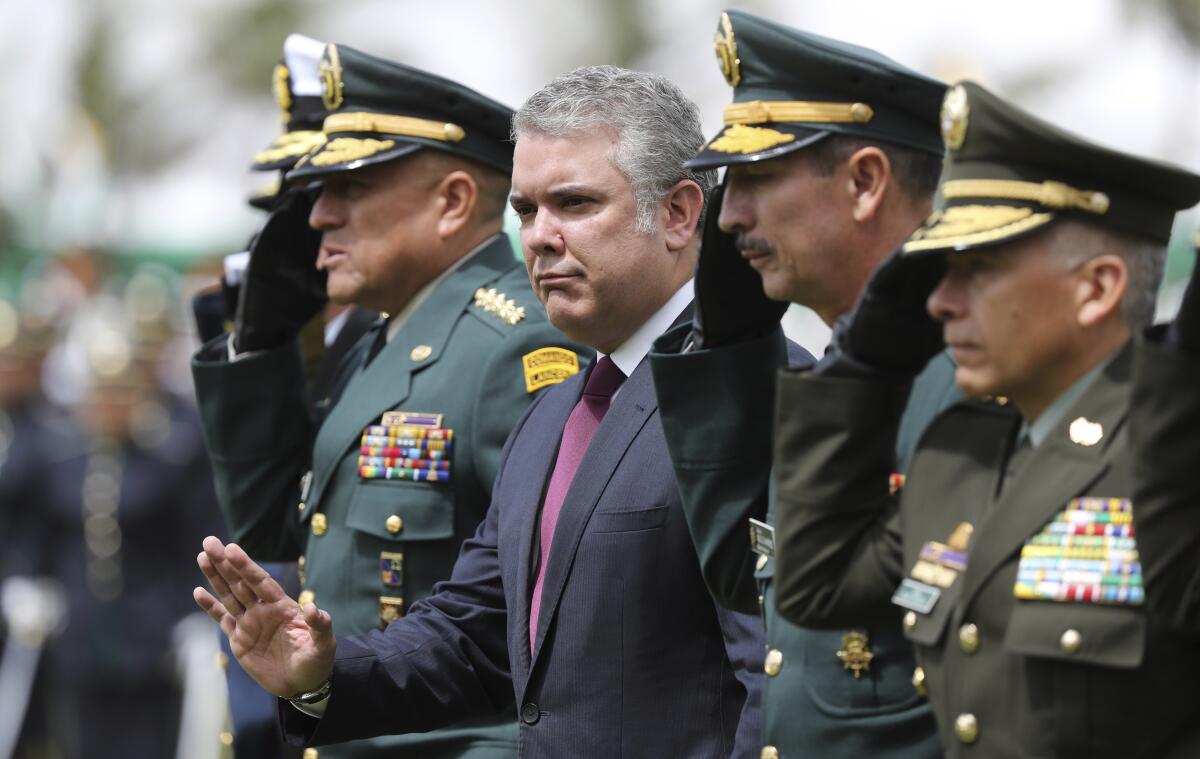Colombia protesters hope to channel wave of discontent

BOGOTA, Colombia — Colombians angry with conservative President Iván Duque hoped to channel Latin America’s wave of discontent as they took to the streets Thursday with a long list of grievances, led by persistent economic inequality and rampant violence against social activists.
Labor unions, student groups and ordinary citizens began gathering for what could be one of the nation’s biggest demonstrations in recent years, testing an unpopular government as unrest grips the region.
Analysts were skeptical, however, that the event would generate any prolonged unrest like that seen recently in Bolivia, Chile and Ecuador, noting a lack of unifying factors in a divided country that is one of the region’s stronger economic performers.
“We’re not in a pre-insurrectional climate,” said Yann Basset, a professor at Bogota’s Rosario University. “I’m not sure there’s a general rejection of the political system.”
The Duque government is nevertheless on edge, deploying 170,000 officers to enforce security while closing border crossings and deporting 24 Venezuelans accused of entering the country to instigate unrest.
“They are preparing as if for a war,” said Ariel Ávila, deputy director of the Peace and Reconciliation Foundation. “But it’s very vague what they’ve shared about any potential disturbances.”
Duque, who has a lackluster 26% approval rating, has gone on a charm offensive, seeking to connect with citizens and counter erroneous claims on social media that he has proposed to raise the retirement age and reduce wages for young workers.
“I’m not here to talk about a garden of roses,” he said in a radio interview. “I’m talking about a country that is recovering, an economy that is improving and is today one of the best in Latin America.”
Still, many Colombians say they have plenty of reasons to be angry.
Despite the previous administration’s 2016 peace accord with leftist rebels, much of Colombia is still engulfed in violence as illegal armed groups compete for territory where the state has yet to establish a presence. Dozens of indigenous and social leaders have been killed in crimes that remain largely unsolved. The Duque administration has made a small dent in reducing coca crops, but fields of the plant used to make cocaine still cover wide swaths of the country.
Meanwhile, Duque’s government has faced a series of embarrassing setbacks.
Defense Minister Guillermo Botero resigned in early November following revelations that at least eight minors had been killed in a bombing that targeted a small band of dissidents. Duque’s key ally, former President Álvaro Uribe, is under investigation for alleged witness tampering. And Duque himself drew criticism after holding up photos at the U.N. General Assembly that he said were proof that the socialist government in neighboring Venezuela harbors leftist Colombian rebels – only to find out later that at least one of the images was taken in Colombia.
Colombia’s economy has been growing at a faster rate this year, but it still has one of the highest levels of inequality in South America. Nearly 11% of Colombians are out of work, a figure that jumps to 17.5% for young adults.
“The country is facing a profound crisis,” said Daniel Sanchez, an architecture student backing the protest Thursday. “The government isn’t listening to the people.”
Unlike other recent protests, there has been no single event sparking the demonstrations, but rather an array of complaints that vary widely depending on who is asked.
Comments from Cabinet ministers on potential financial reforms have raised concerns among union members about pension and work rule overhauls — though Duque’s administration insists no such proposals exist.
Student groups accuse the government of not fully complying with an agreement to boost education funding after a swell of protests last year. Duque has increased the education budget to what he says is the highest level in Colombia’s history, while student activists contend science funding is still lacking.
Student leader José Cárdenas said demonstrators would evaluate what actions they might take in the days ahead to keep momentum going.
“What happened in Chile sent a forceful message,” he said.
More to Read
Sign up for Essential California
The most important California stories and recommendations in your inbox every morning.
You may occasionally receive promotional content from the Los Angeles Times.










